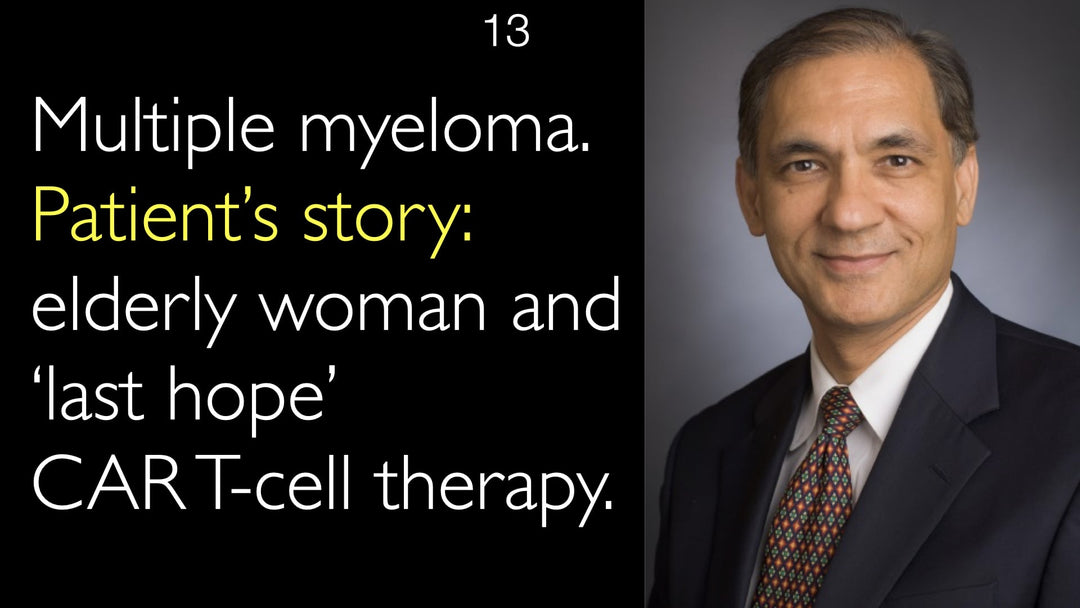Le Dr C. Richard Boland, éminent spécialiste de la génétique du cancer colorectal, explique comment l'instabilité des microsatellites (IMS) influe sur le choix du traitement et le pronostic du cancer du côlon. Il détaille pourquoi 15 % des tumeurs colorectales présentent cette signature génétique, l'importance cruciale du test IMS pour une thérapie personnalisée, et la réponse différente de ces tumeurs à la chimiothérapie par rapport aux cancers à microsatellites stables.
Instabilité des microsatellites dans le cancer colorectal : clé des décisions thérapeutiques personnalisées
Aller à la section
- Qu'est-ce que l'instabilité des microsatellites ?
- Découverte et contexte historique
- Fonctionnement du test MSI
- Lien entre MSI et syndrome de Lynch
- Réponse à la chimiothérapie dans les tumeurs MSI
- Implications pronostiques de la MSI
- Approche thérapeutique personnalisée
- Transcript intégral
Qu'est-ce que l'instabilité des microsatellites ?
L'instabilité des microsatellites (MSI) est une signature génétique présente dans environ 15 % des cancers colorectaux, définissant un sous-type moléculaire distinct. Selon le Dr C. Richard Boland, MD, la MSI survient lorsque les cellules tumorales ne parviennent pas à répliquer correctement les courtes séquences d'ADN répétitives, appelées microsatellites, en raison d'un défaut du système de réparation des mésappariements.
Ces microsatellites consistent en des motifs nucléotidiques répétés (tels que AAAAA ou CACACACA) qui restent normalement stables lors de la division cellulaire. En cas de défaillance de la réparation des mésappariements, les tumeurs accumulent des centaines de milliers de mutations dans ces séquences, créant ainsi la signature MSI qui influence considérablement les choix thérapeutiques.
Découverte et contexte historique
Avant le milieu des années 1990, comme le note le Dr C. Boland, MD, la classification des cancers colorectaux reposait uniquement sur des caractéristiques microscopiques, telles que la différenciation tumorale, offrant peu d'orientation pour le traitement. La découverte de la MSI a révolutionné la compréhension du cancer colorectal en introduisant les diagnostics moléculaires.
Le Dr C. Richard Boland, MD souligne que cette avancée a permis aux cliniciens de dépasser les évaluations morphologiques pour accéder à un profilage génétique précis, guidant directement les stratégies thérapeutiques et permettant de prédire l'évolution des patients.
Fonctionnement du test MSI
Le test MSI actuel examine des séquences microsatellitaires spécifiques, très sensibles aux défauts de réparation des mésappariements. Le Dr C. Boland, MD explique les critères diagnostiques : « S’il y a deux séquences microsatellitaires mutées ou plus, on parle d’instabilité des microsatellites. »
Ce test simple mais puissant identifie à la fois les cancers héréditaires du syndrome de Lynch (causés par des mutations germinales des gènes de réparation des mésappariements) et les cas sporadiques (souvent dus à l’inactivation du gène MLH1 par méthylation). Son utilité clinique s’étend du diagnostic à la prise de décision thérapeutique.
Lien entre MSI et syndrome de Lynch
Le Dr C. Richard Boland, MD souligne que le test MSI a initialement permis d’identifier presque tous les cas de syndrome de Lynch, une condition héréditaire représentant environ 3 % des cancers colorectaux. Le même test détecte également 12 % supplémentaires de cancers colorectaux sporadiques avec inactivation épigénétique de MLH1.
Cette double capacité diagnostique rend le test MSI indispensable tant pour le conseil génétique familial que pour la planification thérapeutique individuelle, faisant le lien entre l’évaluation du risque héréditaire et l’oncologie de précision.
Réponse à la chimiothérapie dans les tumeurs MSI
Le statut MSI influence crucialement la réponse à la chimiothérapie. Le Dr Boland révèle une découverte majeure : « Les tumeurs avec instabilité des microsatellites ne tirent aucun bénéfice supplémentaire de la chimiothérapie – on observe même un sur-risque. » Cette réponse contre-intuitive nécessite une personnalisation du traitement.
Les recherches montrent que les protocoles à base de 5-fluorouracile, standards pour les tumeurs microsatellites-stables, peuvent en réalité aggraver le pronostic des cancers colorectaux MSI-haut, justifiant des approches alternatives pour ce sous-type moléculaire.
Implications pronostiques de la MSI
Malgré leur faible réponse à la chimiothérapie, les cancers colorectaux MSI-haut ont généralement une évolution plus favorable. Le Dr C. Richard Boland, MD décrit cela comme « deux phénomènes concurrents » : bien que ces tumeurs soient intrinsèquement moins agressives, les traitements conventionnels peuvent annuler leur avantage de survie.
Les études démontrent que les patients MSI-haut présentent souvent une meilleure survie sans traitement ou sous immunothérapie plutôt que sous chimiothérapie traditionnelle, soulignant l’importance d’une classification moléculaire précise avant toute initiation thérapeutique.
Approche thérapeutique personnalisée
Le Dr Boland présente le test MSI comme la première étape cruciale de la médecine de précision en cancérologie colorectal. « C’était le premier pas vers la médecine personnalisée pour le traitement du cancer colorectal », déclare-t-il, soulignant comment la stratification moléculaire guide les décisions thérapeutiques.
Les recommandations actuelles préconisent le test MSI pour tous les cancers colorectaux, car les résultats déterminent l’éligibilité à la fois à l’évitement de la chimiothérapie et aux immunothérapies émergentes, particulièrement prometteuses pour les tumeurs MSI-haut en raison de leur fardeau mutationnel élevé.
Transcript intégral
Dr Anton Titov, MD : Qu’est-ce que l’instabilité des microsatellites dans le cancer colorectal ? Que signifie une instabilité microsatellitaire élevée pour le pronostic ? Comment choisir la chimiothérapie chez les patients présentant une instabilité microsatellitaire élevée ?
Dr C. Boland, MD : La médecine de précision dans le traitement du cancer colorectal implique de distinguer le cancer colorectal comme entité unique en de nombreux sous-types, différant par leur nature moléculaire. Environ 15 % des tumeurs colorectales présentent une altération génétique spécifique appelée instabilité des microsatellites. La MSI dans le cancer colorectal est très importante pour le choix thérapeutique et le pronostic.
Dr Anton Titov, MD : Quel est le rôle de l’instabilité des microsatellites pour personnaliser le traitement et évaluer le pronostic dans le cancer colorectal ?
Dr C. Boland, MD : Excellente question ! Revenons un instant en arrière. Avant le milieu des années 1990, les seuls critères pour distinguer les cancers colorectaux étaient : le degré de différenciation et la production de mucine. Aucun de ces éléments n’était vraiment utile pour les décisions thérapeutiques.
Puis l’instabilité des microsatellites a été découverte dans les tumeurs colorectales. Il s’agit d’une signature génétique. Les séquences microsatellitaires sont de courtes séquences nucléotidiques répétitives dans l’ADN. Par exemple, une série d’adénines alignées ou de répétitions CA.
Normalement, ces séquences sont répliquées fidèlement de la cellule mère à la cellule fille. Mais elles nécessitent le système de réparation des mésappariements pour une réplication correcte. Ainsi, dans les cancers avec un système défectueux, les cellules ne parviennent pas à bien répliquer ces séquences. La tumeur accumule alors des centaines de milliers de mutations dans ces régions.
Nous avons sélectionné des séquences microsatellitaires très sensibles à la perte de ce système. On peut alors réaliser un test simple. S’il y a deux séquences microsatellitaires mutées ou plus, on parle d’instabilité des microsatellites.
Dr C. Boland, MD : Cette découverte initiale nous a permis d’identifier presque tous les cancers colorectaux du syndrome de Lynch, ainsi que 12 % de cas supplémentaires avec inactivation du gène MLH1 par méthylation. Cela a éclairé l’hérédité du cancer colorectal dans les familles.
Nous avons aussi réalisé que les tumeurs avec instabilité des microsatellites ne répondaient pas de la même manière à la chimiothérapie. Elles n’en tiraient aucun bénéfice supplémentaire. On observait même un sur-risque lié à la chimiothérapie dans ces cas.
Par ailleurs, les cancers colorectaux avec instabilité des microsatellites avaient une évolution naturelle plus favorable. Deux phénomènes entraient donc en jeu. Les patients avec une tumeur MSI avaient plus de chances de survivre, mais nous étions moins susceptibles de les aider avec une chimiothérapie standard.
Ce fut la première étape vers la médecine personnalisée pour le cancer colorectal.








